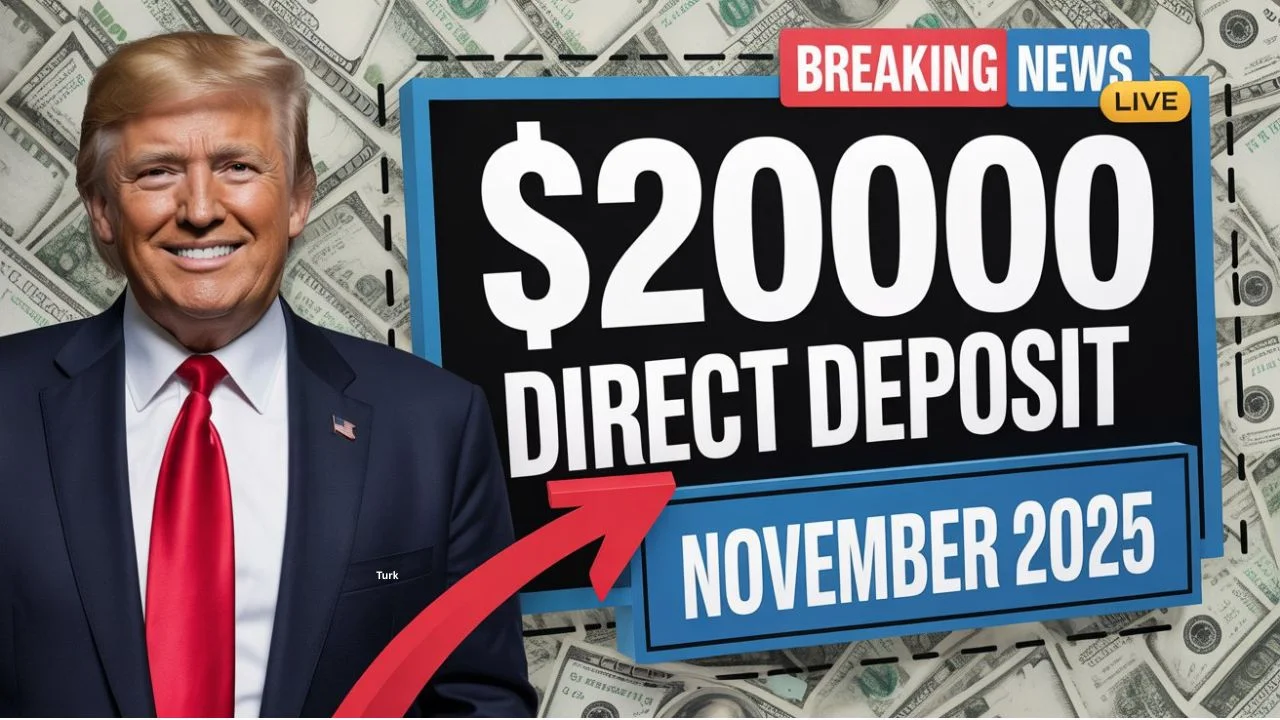In recent weeks, there has been growing buzz around the possibility of a $2000 direct deposit from the IRS coming this November. Many Americans are wondering if another round of stimulus checks is really on the way, and who might be eligible for it. With the cost of living still high and inflation continuing to affect everyday expenses, this topic has captured everyone’s attention. Let’s break down the facts, the rumors, and what people should actually expect regarding this potential payment.
Understanding the Background
Since the pandemic, the U.S. government has issued multiple stimulus payments to help families cope with economic challenges. These payments, officially known as Economic Impact Payments, were sent through the IRS directly to qualified individuals. Each round was designed to give financial relief, especially to lower and middle-income households.
However, as of 2025, there is no official announcement from the IRS or the federal government confirming a new $2000 stimulus check. Still, some states have introduced their own rebate or relief programs, leading to confusion among citizens who believe a new federal check is being rolled out.
Why Are People Talking About $2000 Payments?
The current rumors mostly stem from state-level programs and social media discussions. Some states continue to send out tax rebates, inflation relief checks, or other financial aid to residents. When these payments get reported online, they often get mistaken for national stimulus checks.
In addition, several advocacy groups and lawmakers have pushed for another round of direct aid, arguing that rising rents, grocery prices, and healthcare costs still burden millions of Americans. While these discussions are ongoing, nothing has been finalized on a federal level.
Possible Scenarios Behind the $2000 Deposit
If any payments do happen in November, they are more likely tied to specific state programs, tax refunds, or Social Security adjustments, rather than a new nationwide stimulus plan. Here are a few situations where citizens might still receive direct deposits from the IRS or state authorities this month:
-
Tax Refund Adjustments: The IRS continues to process backlogs and corrections for the 2022–2023 tax years. Some people may receive additional refunds.
-
Earned Income Tax Credit (EITC): Low and moderate-income workers who qualified for this credit may still be getting payments if their returns were delayed.
-
State Rebates or Relief Funds: States like California, Colorado, and Maine have previously issued inflation-related payments.
-
Social Security or SSI Payments: Seniors and people with disabilities might see additional cost-of-living adjustments in their accounts.
Overview Table
| Topic | Details |
|---|---|
| Rumored Amount | $2000 per eligible individual |
| Official Status | Not confirmed by the IRS or U.S. Treasury |
| Possible Payment Source | State relief, tax refunds, or EITC adjustments |
| Expected Date | November 2025 (based on rumors, not official) |
| Eligibility | Varies by state and income level |
| IRS Role | Processing refunds and previous credits, no new stimulus program announced |
What the IRS Has Actually Said
The IRS has made it clear that it is not currently sending out new federal stimulus checks. Its official focus remains on ensuring that people receive any missed or delayed payments from previous relief programs. The agency also continues to process recovery rebate credits for individuals who didn’t get their earlier checks.
To verify whether you are due any payment, the IRS advises using its “Get My Payment” or “Where’s My Refund?” tools available on the official IRS website. These tools are the safest and most accurate way to track any potential deposits.
Economic Relief Still Exists — But in Different Forms
While another federal stimulus might not be happening right now, Americans still have access to other relief measures. These include:
-
Child Tax Credit (CTC): Families with children can still claim expanded credits for 2024 when filing their returns.
-
Earned Income Tax Credit (EITC): Low-income workers may receive up to a few thousand dollars, depending on family size.
-
State-Level Benefits: Some states continue offering targeted rebates or energy cost assistance.
-
Social Security COLA: Beneficiaries will see an increase in 2025 to help offset inflation.
Avoid Scams and False Claims
Whenever stimulus rumors resurface, so do scams. Fake websites and emails pretending to be from the IRS have appeared in the past, tricking people into giving personal details or bank information. Remember these key points:
-
The IRS never asks for personal or banking details over email or text.
-
Any official payment information will only be available on IRS.gov.
-
Avoid clicking on suspicious links promising “instant deposits” or “priority stimulus approval.”
What to Do If You’re Waiting for a Payment
If you think you might qualify for a past refund, tax credit, or missed stimulus payment:
-
Check Your IRS Account: Log in at the IRS website to view your payment and refund status.
-
Review Your Tax Filings: Make sure you’ve filed all returns for 2020–2023. Missing returns could delay any payment.
-
Contact the IRS: Use official phone numbers or local IRS offices for help, not third-party services.
Looking Ahead
While a $2000 federal stimulus check has not been approved, the government continues to provide targeted support through various programs. The next few months may bring new budget discussions in Congress, and lawmakers could still propose direct relief if the economic situation worsens. Until then, Americans should stay informed, cautious, and rely only on verified government updates.
FAQs
1. Is the IRS sending out $2000 checks in November 2025?
No, there is no official confirmation from the IRS or U.S. Treasury about a new $2000 stimulus payment. Most reports online are based on rumors or state-level programs.
2. Who could receive money from the IRS this month?
You might still receive money if you’re owed a tax refund, EITC payment, or recovery rebate credit from previous years. Some states are also issuing local relief payments.
3. How can I check if I’m eligible for any payment?
You can log in to your IRS online account or use the “Where’s My Refund?” tool on the IRS website to verify any pending deposits or refunds.
4. Are any states offering their own $2000 payments?
Some states have sent out relief checks or tax rebates, but the amount and eligibility vary. These are separate from any federal stimulus programs.
5. How can I avoid stimulus payment scams?
Only trust official information from IRS.gov. Do not share your Social Security number, bank details, or personal data with anyone claiming to “fast-track” payments.
Final Verdict
As of now, the talk about a $2000 IRS direct deposit in November appears to be just that — talk. There’s no federal confirmation or official rollout. However, some taxpayers might still receive other forms of relief or refunds from the IRS. It’s important to stay cautious, verify facts, and keep an eye on official updates. Financial help is still available through existing programs, even if a new nationwide stimulus check isn’t on the way.




